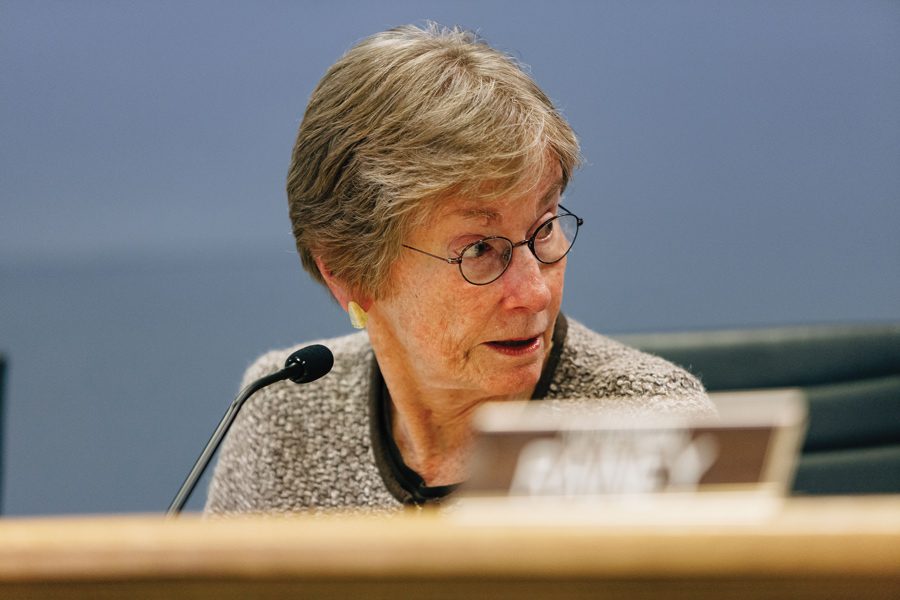Evanston proposes two-year climate action plan implementation strategy
Daily file photo by Noah Frick-Alofs
Ald. Eleanor Revelle (7th) speaks at a city council meeting. Revelle called the CARP implementation strategies “ambitious”
March 4, 2019
City staff proposed a two-year implementation strategy for the Climate Action and Resilience Plan at the Human Services Committee meeting Monday.
The implementation strategy would carry through 2020, and would be reassessed after the two-year time frame, according to Kumar Jensen, Evanston’s sustainability coordinator. The implementation strategy provides 43 specific actions for achieving the goals listed in CARP, from providing composting at all municipal facilities to phasing out single-use products such as plastic bags and straws.
City Council passed CARP, the long-term action plan listing Evanston’s goals for mitigating and adapting to climate change, in December 2018. The general plan utilizes three guiding principles for environmental policy: equity-centered, outcome-focused and cost-effective and affordable.
“The plan sets forward milestones that are pretty significant and a lot of the stuff does have some significant runway time,” Jensen said. “It takes some planning, it takes some evaluation. There are some actions that we’re already working on and making progress on… but it’s a little complicated.”
Many of the proposed action items focus on identifying issues with implementing environmental reform. In particular, the city wants to identify barriers for low- and moderate-income housing to achieving net-zero building emissions. For aldermen with constituents in those demographics, the ambitious aspects of CARP pose significant economic obstacles.
“In my ward, I have a lot of seniors on fixed income,” Ald. Judy Fiske (1st) said. “Coupled with this, I have lots of small businesses that are struggling to survive. I can tell you stories about the cost even for a lot of them replacing light bulbs.”
Evanston has submitted a grant request to Partners for Places, Evanston Community Foundation and Chicago Community Trust for $250,000 to help fund CARP’s evaluation. Ald. Eleanor Revelle (7th) said that if low- and moderate-income residents can overcome affordability barriers to install environmentally friendly technology, they can save money in the future.
“Given that equity is one of our key principles for the plan, I think it’s really good that we’re pursuing this funding,” Revelle said. “Ultimately, as residents do make their homes more energy efficient, that will help them save money on their utility bills. Eventually, it’ll be a big benefit to them.”
The 2019-2020 implementation strategy also includes a comprehensive stormwater plan. According to Jensen, climate change can cause more intense and frequent storms, which can overwhelm Evanston’s current infrastructure. The comprehensive plan would not only look at which areas in Evanston are most likely to flood, but also which areas in Evanston don’t have the infrastructure to handle any flooding.
“It’s not just about where is all the water going, but what properties is it ending up on and how well-equipped are those properties to actually deal with that water when it does arrive?” Jensen said.
City staff estimate the stormwater plan would cost $100,000. Other aspects of the first implementation strategy don’t have clear costs yet, but city staff estimate that the 2019-2020 implementation strategy will cost a total initial cost of $579,000.
Jensen hopes to meet up with the human services committee in April to discuss transitioning from administrative tasks to policy. He also hopes to align CARP implementation strategies with annual budget cycles, so the committee and the City Council can consider both at the same time.
“Well this is certainly very ambitious,” Revelle said, “as is CARP itself.”
Email: [email protected]
Twitter: @emmaeedmund
Related Stories:
– Evanston passes plan that aims for 100 percent renewable electricity by 2030
– Evanston plan to combat climate change emphasizes equity


